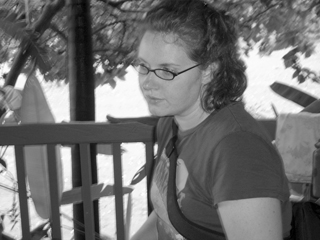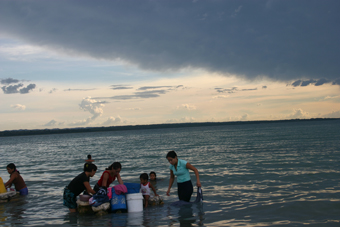Jessica Walter
 In the middle of July, I packed my bags and headed south to be an Orientation Leader for Eastern Mennonite Seminary’s LEAP program. LEAP, which stands for Learning, Exploring, and Participating, is a three week theological and cross-cultural exploration experience for high school students who have been recognized in their churches as rising leaders. The program guides students from urban, rural, and suburban backgrounds through a week of theological reflection focusing on where God is calling them and then sends them off to experience and witness how God is moving in another culture. This year the LEAP trips included Trinidad and Tobago, Mexico City, and Guatemala (my trip). As an Orientation Leader my job was to act as a chaperone, Resident Assistant, shepherd, guide, moral booster, encourager, friend, and Big Sister.
In the middle of July, I packed my bags and headed south to be an Orientation Leader for Eastern Mennonite Seminary’s LEAP program. LEAP, which stands for Learning, Exploring, and Participating, is a three week theological and cross-cultural exploration experience for high school students who have been recognized in their churches as rising leaders. The program guides students from urban, rural, and suburban backgrounds through a week of theological reflection focusing on where God is calling them and then sends them off to experience and witness how God is moving in another culture. This year the LEAP trips included Trinidad and Tobago, Mexico City, and Guatemala (my trip). As an Orientation Leader my job was to act as a chaperone, Resident Assistant, shepherd, guide, moral booster, encourager, friend, and Big Sister.
Just two weeks after I arrived in Virginia, including two long days of preparation and travel, I sat down to a home cooked meal at my new residence in Guatemala with a sigh of happy relief. We were here. We had successfully made it through a travel schedule that started at midnight (meaning leaders didn’t sleep much), three airports, an encounter with Pollo Campero (a well-known Guatemalan fast food restaurant), and a bumpy ride up to the camp where we would stay for the next five days. As we sat down to our meal I looked around the table and realized I was about to spend the next 11 days in Guatemala with some of the brightest and funniest young men and women I had ever met, a co-Orientation Leader whose company and perspective I enjoy, a pastor and her husband who are both thoughtful adults and hilarious big kids, and founding members of the Mennonite Church in Guatemala Gilberto and Rosa Flores. God had orchestrated a dream team for this trip and I was going to take Gilberto’s advice for our group to “enjoy the moment!”
As the days went on and we met moments of joy and moments of trial a theme began to arise among our small team; we all began to question. What is God doing in Guatemala? Where is God here? Where is God in my life? What would I say to someone who wants to know why they should be a Christian? What is God’s calling on my life? What is my purpose? How is this trip changing me? How is God moving even in places where it looks like God is not being honored? How can a people be so faithful in the midst of persecution and poverty? What are the motivations behind a church’s attempt to grow? How do others experience God’s calling? What are experiences with God and how can I recognize them? What are the parallels and the differences between the church in Guatemala and the United States? What does God have in store for the church in Guatemala?
 I began to ask some of the same questions that the students on our trip were wrestling with too. One evening in the middle of our trip I sat down on the shore of Lake Petén Itzá with Gilberto and talked with him about the poverty in his native country as we watched women and men wash clothing and themselves in the lake as well as fill barrels for drinking water. As our conversation ended Gilberto went back to reading his newspaper and I sat silently reflecting that I had suddenly changed. I now had a new question that lingers with me: How can I go back to life as normal when I know more about the pain of this world and have allowed this experience to change me?
I began to ask some of the same questions that the students on our trip were wrestling with too. One evening in the middle of our trip I sat down on the shore of Lake Petén Itzá with Gilberto and talked with him about the poverty in his native country as we watched women and men wash clothing and themselves in the lake as well as fill barrels for drinking water. As our conversation ended Gilberto went back to reading his newspaper and I sat silently reflecting that I had suddenly changed. I now had a new question that lingers with me: How can I go back to life as normal when I know more about the pain of this world and have allowed this experience to change me?
I am back here participating in my “normal” routine; I write blogs, edit articles, go to meetings, buy groceries, and hang out with friends but I am different. I think even more critically then I did before about where I spend my time and my money. I have found myself willing to sacrifice my hunger for adventure for a slower, more intentional life that values relationships over tasks. It is a focus to live in the moment being present right here, right now. (Click) to see photos.

The opinions expressed in articles posted on Mosaic’s website are those of the author and may not reflect the official policy of Mosaic Conference. Mosaic is a large conference, crossing ethnicities, geographies, generations, theologies, and politics. Each person can only speak for themselves; no one can represent “the conference.” May God give us the grace to hear what the Spirit is speaking to us through people with whom we disagree and the humility and courage to love one another even when those disagreements can’t be bridged.
